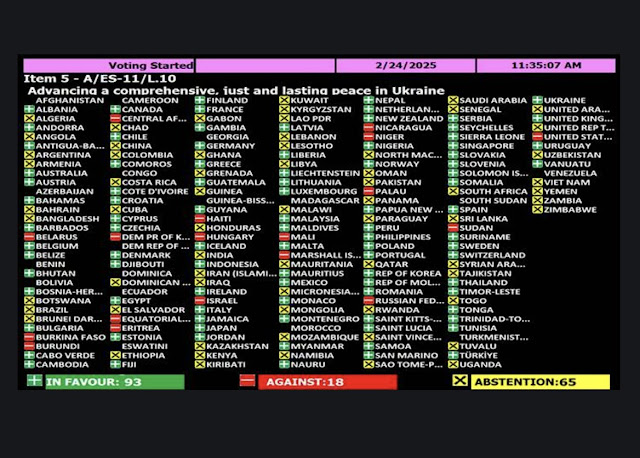U.S. Aligns with Russia and Belarus in Controversial UN Vote Amid Ukraine Conflict
U.S. Aligns with Russia and Belarus in Controversial UN Vote Amid Ukraine Conflict
In a move that has sent shockwaves through the international community, the United States, under President Donald Trump, cast a vote alongside Russia and Belarus against a United Nations General Assembly resolution condemning Russia's actions in Ukraine. This decision, marking a significant shift in U.S. foreign policy, has drawn widespread criticism and raised questions about America's commitment to its traditional alliances and the principles of international law.
A Stark Departure from Previous U.S. Stance
On the third anniversary of Russia's invasion of Ukraine, the UN General Assembly adopted a resolution demanding an immediate cessation of hostilities and the withdrawal of Russian forces from Ukrainian territory. The resolution garnered substantial support, passing with 93 votes in favor, 18 against, and 65 abstentions. Notably, the United States was among the minority opposing the measure, aligning itself with Russia, Belarus, North Korea, and a handful of other nations. This alignment has been perceived as a dramatic departure from the U.S.'s historical stance on supporting Ukrainian sovereignty and opposing Russian aggression.
The U.S. Alternative Resolution
In lieu of supporting the European-backed resolution, the United States introduced its own draft, which notably did not mention Russia's aggression or call for the withdrawal of Russian troops. Instead, it called for a swift end to the conflict and urged a lasting peace between Ukraine and Russia. This approach was met with resistance from European allies and Ukraine, who insisted on language that explicitly condemned Russia's actions and demanded the restoration of Ukraine's territorial integrity. The U.S. resolution failed to gain traction and was ultimately rejected in favor of the more assertive European-backed resolution.
International and Domestic Repercussions
The U.S.'s decision to vote against the resolution condemning Russia has been met with a chorus of disapproval from both international allies and domestic political figures. European leaders have expressed dismay at the U.S.'s apparent shift towards a more conciliatory stance towards Russia, fearing it could embolden further aggression and undermine collective security efforts. Domestically, lawmakers from both parties have criticized the move, with some accusing the administration of abandoning Ukraine in its time of need and compromising democratic values.
Potential Motivations Behind the U.S. Vote
Several factors may have influenced the U.S.'s controversial vote. President Trump has expressed a desire to improve relations with Russia and has been engaged in direct negotiations with President Vladimir Putin. Additionally, there have been reports of potential economic agreements between the U.S. and Russia, including discussions about energy resources and rare earth minerals. These diplomatic and economic considerations may have played a role in the administration's decision to adopt a more Russia-friendly position at the UN.
The United States' decision to align with Russia and Belarus in voting against a UN resolution condemning Russian aggression in Ukraine represents a significant and contentious shift in U.S. foreign policy. This move has strained relationships with traditional allies, raised questions about America's commitment to international law and democratic principles, and sparked a robust debate about the future direction of U.S. engagement on the global stage. As the situation continues to evolve, the international community will be closely monitoring the implications of this policy shift and its impact on the ongoing conflict in Ukraine.


Comments
Post a Comment